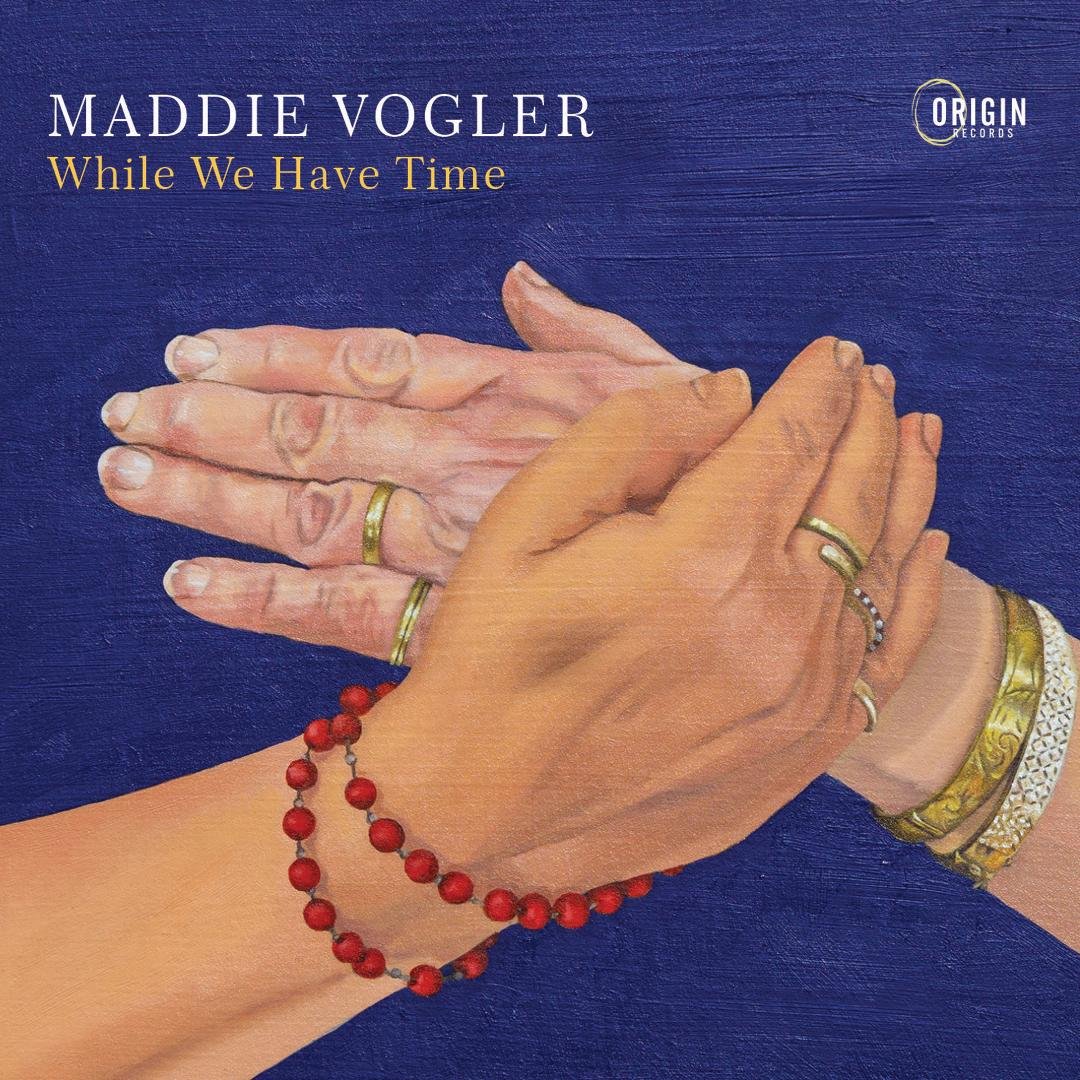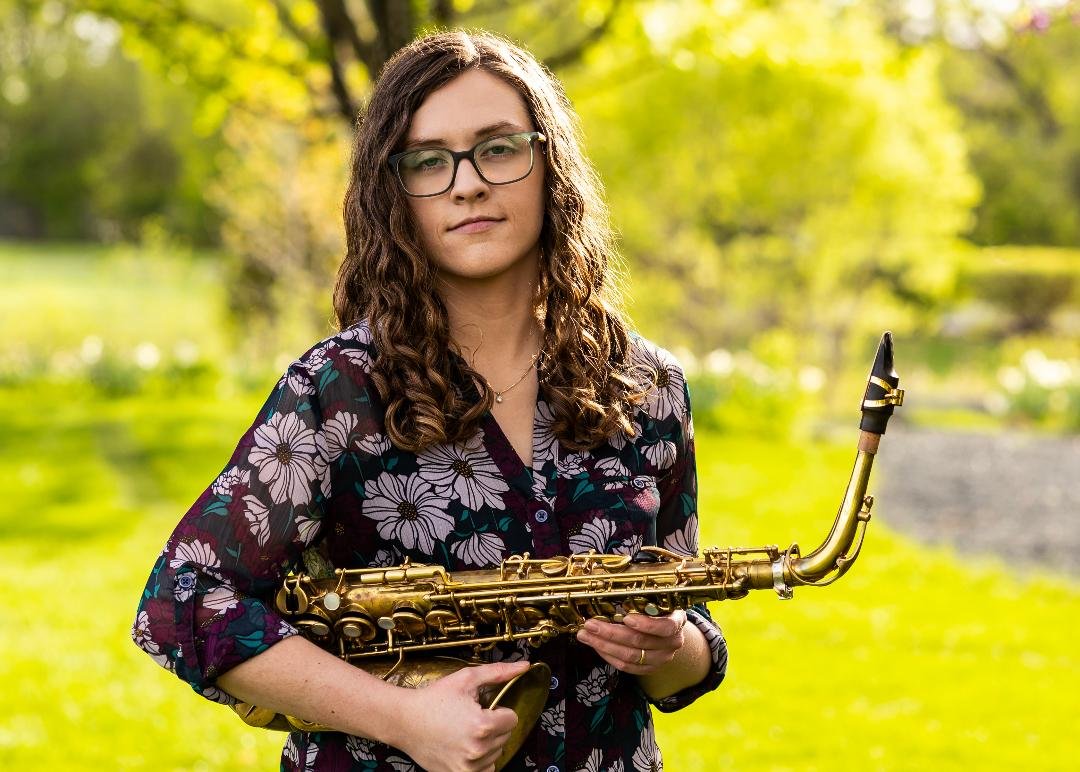Maddie Vogler to Celebrate Family, Culture, and Identity at the Chicago Jazz Festival
Saxophonist to bring sextet to the Von Freeman Pavilion
Red rosary beads, encircling a wrist, intersect in unison with another wrist embraced by a bracelet. These hands belong to two women who share one familial fact: their granddaughter, whose name appears on the album cover pictured above, is Maddie Vogler, an alto saxophonist who celebrates family, culture, and identity through music.
While We Have Time, Vogler’s first album, features nine original compositions performed by a sextet that includes trumpeter Tito Carrillo and guitarist Matt Gold. Vogler’s ensemble will perform at this year’s Chicago Jazz Festival on Friday, August 30, 11:30 a.m., at the Von Freeman Pavilion.
Before discussing her intent and inspiration that produced each song, Vogler explained how her grandmothers participated in the cover’s creation. After both grandmas’ hands were photographed simultaneously, artist Diana Cisneros created a painting from the image.
“The really special thing about it is they are wearing jewelry that came from their own families,” Vogler said, during a recent conversation. “My grandma from Cuba has the rosary beads, because that’s important to her culturally. My other grandma has a bracelet that her parents gave her when she was 16, before she left Ireland to move to America. These pieces mean a lot to them and the people that came before them.”
More family members are celebrated by Vogler through the title track, which she called “the heart of the record.” This song’s nostalgic feel, along with her idea exchanges with Carrillo, made it a memorable take.
“That song is about spending time with loved ones and really being present. That’s so much of what music making is about as well,” she said. “I think the whole album encompasses these ideas, so naming it after that track made sense.”
“Ropa Vieja,” which Vogler wrote to celebrate the fun times hanging with grandma at Cuban restaurants bring, is also the name of a delicacy that contains shredded beef, tomato sauce, and beans. “Literally translated, it means old clothes,” she said. “It’s a silly name that has to do with how the shredded beef looks.”
While “Ropa Vieja” has a celebratory surface, there exists another deeper meaning that exposes an unavoidable reality.
“There is some frustration about what families gave up when they had to assimilate. For my family, that was language,” Vogler said. “For a lot of first- generation people, that’s one of the first things to go. The younger generation will typically lose the language.”
When discussing this song, Tito Carrillo noted how Vogler’s whole soul got exposed when she introduced the melody.
“It starts with this slow, Latin-inspired, almost bolero type of vibe, transitions into a very fast groove in seven, and then skyrockets from there,” Carrillo said via phone from his home in Texas. “I didn’t even know at the time (of recording) that her grandmother was from Cuba.”
Alto saxophonist Maddie Vogler and her sextet, featuring trumpeter Tito Carrillo and pianist Jake Shapiro, will perform Friday, August 30, 11:30 a.m. at the Von Freeman Pavilion.
Trading Thoughts
Vogler met Carrillo in 2012 while studying for a Bachelor’s degree in music education at the University of Illinois-Champaign. Their dialogues on the album, through songs such as “Sunday Colors” and “The Need to Be,” display a familiarity and respect that were years in the creating.
“When I was in school, we would spend hours improvising together,” Vogler recalled. “There is a lot of time built up with us improvising, and I think you can hear that on the record.”
When Vogler returned to the U. of I. as a graduate student in 2020, she continued her studies with Carrillo. “I felt a connection with her musically,” Carrillo recalled. “Her concepts started growing and evolving in a really super organic way, and I just wanted to play more with her.”
Vogler and Carrillo also discussed the imagery and expressions that highlight “Sunday Colors.” When asked about what images the song’s title evoked, Vogler talked about a tranquil Sunday morning. “The sun has come up, and it’s still cool outside. But you can tell it’s going to be a hot day.”
Carrillo, when recalling this tune, called its deliberate melody “hymn like.” Vogler’s arrangement also allowed Carrillo to express himself on the flugelhorn.
“That’s an important part of my voice as a trumpet artist,” he said. “I love playing the flugelhorn. It serves as a nice balance to my trumpet playing.”
In contrast to the peace present in “Sunday Colors,” angst drives “The Need to Be,” the album’s opener. “To me, that song is about identity, finding yourself, and the ups and downs of that journey,” said Vogler, who added that this song’s persistent push and constant changes make it a stressful, but rewarding, performance piece.
Vogler did note, however, how guitarist Matt Gold met all the song’s multiple demands.
“There are some points where the guitar is serving as a third horn line, essentially. It’s matching what the saxophone and trumpet are doing,” she said. “Later in the song it’s the melody voice with the piano, and then it’s providing more comping and rhythmic components.”
Performing “The Need to Be” live, Carrillo added, moves listeners even after its completion, especially after drummer Neil Hemphill’s boiling, rolling solo and Vogler and Carrillo’s final exclamation points.
“I can’t tell you how many people come up after a concert and say, ‘When you two are going back and forth like that, it takes the music to a whole different level,” Carrillo said. “This is because not only are we trying to bring the energy and excitement, but we are open and listening, not just trying to show off.
“I want more people to hear Maddie, because she’s ready for the spotlight. As a performer, she’s fully formed now,” Carrillo continued. “Every time I hear her play now, she is completely self-assured. She has something to say, and there is no fluff in her playing whatsoever.”


